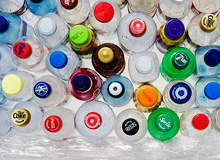
Striking a balance when it comes to making bottles more eco-friendly is tougher than it might seem. Packaging and food processing companies must walk the line between pushing sustainable design forward and creating a product that is convenient and desirable for consumers.
Although techniques to truly revolutionise beverage packaging exist, customers are only willing to accept so much compromise. UK supermarket chain Waitrose recently discovered this, after poor sales forced it to abandon its new range of environmentally friendly milk pouches, which used 75% less plastic than conventional bottles.
Here we present some of the new bottling innovations being developed and launched by organisations trying to reduce the environmental impact of their bottles while keeping customers happy.
The decomposable bottle
The US-based Ritz-Carlton Hotel Company has partnered with bottled water company Prima to introduce decomposable, plant-based water bottles in its US and Caribbean hotel branches. According to Ritz-Carlton, the new bottles are made from 100% plant material and will decompose in a commercial composting facility within one month. The company has also announced that manufacturing the bottles uses 49% less fossil fuel, 45% less energy and produces 75% less greenhouse gas than traditional PET bottles.
It’s a radical change that isn’t currently feasible in the wider retail beverage industry. The bottles can only be recycled in specialised composting facilities, which are still rare, and a hotel chain like Ritz-Carlton is in a position where it can dictate where its used bottles are sent, unlike retail companies.
Retail companies that have launched "compostable" bottled products (BIOTA spring water, for example) have been criticised as it is impractical for most consumers to actually find a compost station. The use of polylactide, the most common polymer used for biodegradable bottles, has also been questioned because it can potentially contaminate the current PET recycling process.
Coca-Cola’s PlantBottle
Although Coca-Cola has been forced to pursue a more conservative sustainability plan with its bottles, the beverage giant has been making a concerted effort to develop eco-friendly bottles. The latest result of this effort is the PlantBottle, a recyclable PET bottle composed of 30% renewable plant-based material. The plant material comes from a mix of sugar cane and molasses, a by-product of sugar processing. A PlantBottle life-cycle analysis carried out by Imperial College London indicates that production of the bottle results in 25% fewer carbon emissions compared to traditional PET bottles.
Reacting to concerns about the recyclability of plant-based materials, Coca-Cola has also announced that the PlantBottle is fully recyclable in existing facilities. The company’s efforts with the PlantBottle have even gained the approval of the World Wildlife Fund.
It’s a step towards Coca-Cola’s publicised goal of creating a completely renewable, fully recyclable bottle. The PlantBottle is being introduced gradually across Coca-Cola’s territories and brands, starting with Denmark, western Canada and the US west coast. The company hopes to produce two billion PlantBottle products by the end of 2010.
Lightweighting
Lightweighting – reducing excess weight – is another trend that many companies are following to reduce the environmental impact of the packaging process. It has shown significant potential for reducing waste and CO2 in the bottling process, as has been recently demonstrated in the UK with the Waste & Resources Action Programme’s (WRAP’s) 300g wine bottle design, developed by a working group which included representatives from supermarket chain Tesco, Quinn Glass and Kingsland Wine & Spirits.
The design is 188g lighter than the average wine bottle and provides substantial CO2 savings during manufacturing. As it is also 71% recycled glass, WRAP hopes that widespread adoption of the bottle could provide a large market for the UK’s green glass surplus.
An immediate Tesco order for ten million of the new bottles will go some way to encouraging a high level of adoption, with other UK supermarkets said to be expressing interest. WRAP has said that if the 300g bottle saw universal adoption in the UK wine retail industry, there would be a glass saving of 153,000t and a 119,000t CO2 reduction.
The Dr Pepper Snapple Group is also investing in a widespread lightweighting programme in order to reduce the environmental impact of its activities, with a particular focus on the reduction of PET plastic. This year, the company aims to reduce the weight of water and carbonated soft drink bottle necks by around 25% in order to achieve the lightest two-litre PET bottle in the industry. The group is aiming for an annual saving of more than 12 million pounds of PET by 2011.
The evolution of environmentally friendly processing techniques has continued rapidly in the last three years and is now solid enough to start making a real change to the sustainability of the bottled-beverage industry. The problem lies with practical, real-world implementation. The bottling landscape is a complex one, with incompatible technologies, competing commercial interests and the potential stubbornness of a demanding customer base. It remains to be seen whether the industry, and the public at large, is willing to make sacrifices for the good of our environment.



